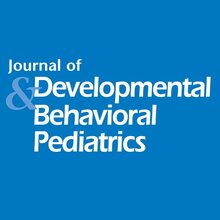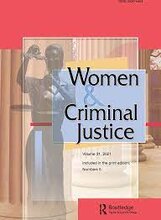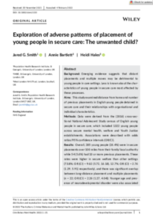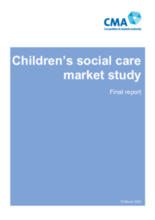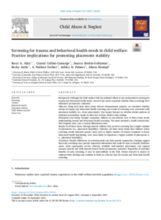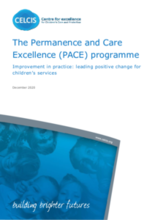Displaying 11 - 20 of 271
This article discussed the proceedings for placement of children in foster care by foreign authorities introduced into Polish law. The available official data indicate that the British and German authorities are the most inclined to place children with Polish citizenship in foster care in their homeland.
Individual studies suggest most children and youth in residential care centres (RCCs) have living parents, and parental death is not the primary antecedent to placement in residential care. The goal of the present review was to examine the literature to better understand the primary antecedents to placement in RCCs overall. One hundred thirty-two studies, including 60,683 children in 47 nations meet eligibility criteria for inclusion for the overarching review of antecedents of placement.
The purpose of this U.S.-based study was to determine whether children with developmental disorders (DDs) in protective custody are more likely to experience specific placement types and stay in care longer than their typically developing peers. Furthermore, in the DD-only group, the authors examined whether the likelihood of each placement type differed by specific DD diagnosis.
This study examines the perceptions of 145 incarcerated mothers of minor children in a large Midwestern jail to understand the correlation between where their children are living during their incarceration and the mothers’ feelings about these placements and relationships with their children. Mothers were most satisfied if children lived with maternal grandparents, and least satisfied if children were in foster care. Women with higher scores for the relationship with close relatives, those having contact with their child(ren) while incarcerated, and mothers with no children in foster care reported feeling better about these placements. The findings highlight the importance of women maintaining contact with their children and their children’s caretakers while incarcerated.
Emerging evidence suggests that distant placements and multiple moves may be detrimental to young people in care settings. Less is known about the characteristics of young people in secure care most affected by these processes. This UK study examined distance from home and number of previous placements in English young people detained in secure care and their relationships with organisational and individual characteristics.
This is a market study conducted by the Competition and Markets Authority (CMA) into children's social care provision in the UK. The study found that there is a shortage of appropriate places in children’s homes and with foster carers, meaning that some children are not getting the right care from their placement. Some children are also being placed too far away from where they previously lived or in placements that require them to be separated from their siblings.The authors recommend the development of national and regional bodies to support local authorities with getting suitable placements for children in the UK.
Findings of this report suggest that early screenings for trauma and behavioral health needs may provide important information that could be used to identify children's needs, make appropriate service referrals, establish well-matched placements, and support resource parents and birth parents toward better permanency outcomes.
In this paper, authors demonstrate how a structured functional well-being assessment can be used with the custody population to promote an understanding of behavioral health needs, inform case planning, and measure functional improvement over time.
This study uses longitudinal administrative data to assess the decision to transfer a family to ongoing child welfare services within twelve months of an initial investigation.
This report provides an insight into the Permanence and Care Excellence (‘PACE’) programme – a Quality Improvement programme underway from 2014-2020 which engaged with local authority partnerships in 27 of the 32 Scottish local authority areas. The programme was aimed at supporting local authority partnerships across Scotland to reduce permanence planning timescales for looked after infants, children and young people using a Quality Improvement framework.

